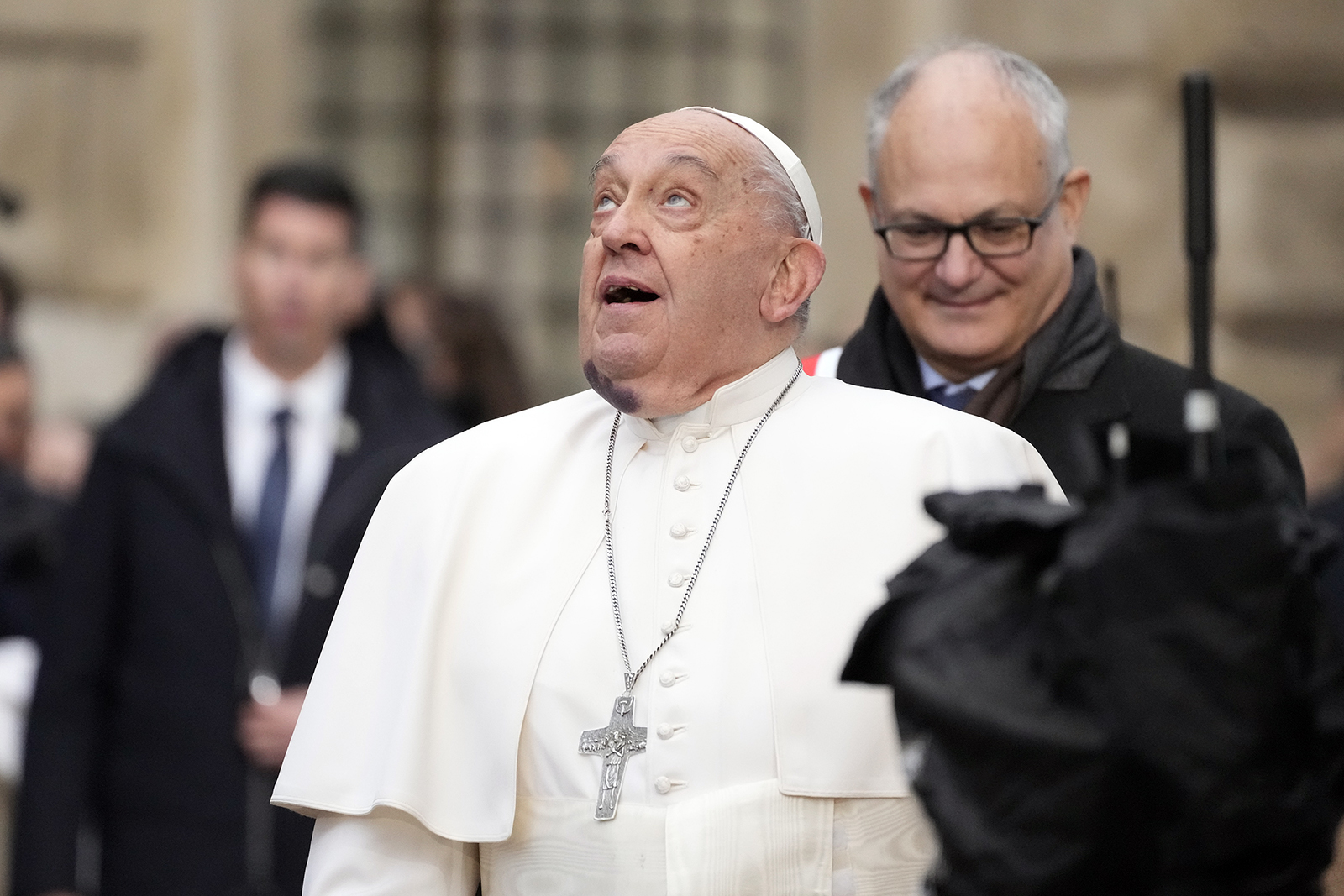(RNS) — The pope’s appeal was made for the World Day of Peace, coinciding with the launch of the 2025 Jubilee year.

Pope Francis arrives to pray in front of the Marian monument of the Column of the Immaculate Conception in downtown Rome on the day the Catholic Church celebrates the Holy Mary, Dec. 8, 2024. (AP Photo/Gregorio Borgia)
Claire Giangravé
December 12, 2024
VATICAN CITY (RNS) — In the year 2000, then-Pope John Paul II appealed to leaders of wealthy nations, asking them to forgive the debt of poorer countries in the spirit of the Catholic Church’s Jubilee year — a time the church sets aside for forgiveness of sins and debt. Meeting prisoners in Rome, John Paul asked that the death penalty, which he called “an unworthy punishment still used in some countries, be abolished throughout the world.”
Twenty-five years later, the church is preparing to celebrate another Jubilee in 2025, but the goals laid out by John Paul continue to seem as distant as ever — nearly 30,000 people are currently on death row around the world, and according to the International Monetary Fund, at least half of developing countries are facing a debt crisis or are on the verge.
Anticipating the World Day of Peace on Jan. 1, Pope Francis renewed John Paul’s appeals earlier this month, asking for the forgiveness of foreign debt, elimination of the death penalty and creation of a fund aimed at eradicating world hunger using money allocated for armaments.
“I urge the international community to work towards forgiving foreign debt in recognition of the ecological debt existing between the North and the South of this world,” Pope Francis wrote in a Dec. 8 statement. “This is an appeal for solidarity, but above all for justice.”
The pope said the death penalty “not only compromises the inviolability of life but eliminates every human hope of forgiveness and rehabilitation.” He said a global fund drawn from money currently allocated for armaments could “eradicate hunger and facilitate in the poorer countries educational activities aimed at promoting sustainable development and combating climate change.”
Francis has often called attention to weapons manufacturers as the chief example of an industry that values profit over human lives. The global arms trade amounted to an estimated $138 billion in 2022, according to the Stockholm International Peace Research Institute.
Jubilee years, patterned on an ancient Jewish custom, were introduced into the church in 1300 by Pope Boniface VIII, and today occur every quarter-century. The 2025 celebration, which officially begins Christmas Eve 2024, is expected to bring over 30 million pilgrims to the Vatican in search of spiritual replenishment or forgiveness of sins.

FILE – Cardinal Michael Czerny meets the journalists at the Vatican press hall, in Rome, on March 30, 2023. (AP Photo/Gregorio Borgia, File)
The pope’s appeal, titled “Forgive us our trespasses: Grant us peace,” is directed especially to those who don’t have hope for the future. “We need to work at eliminating every pretext that encourages young people to regard their future as hopeless or dominated by the thirst to avenge the blood of their dear ones,” Francis said.
Speaking at a Vatican news conference presenting the pope’s message on Thursday (Dec. 12), Cardinal Michael Czerny, who heads the Vatican’s Dicastery for Integral Human Development, said he hopes people will heed Francis’ message to “disarm our hearts.”
In the pope’s message, he said that abolishing international debt would require the creation of a global financial charter founded on justice and fraternity. Czerny recognized that with a growing portion of the debt in private hands, the issue is more complex today than it was 25 years ago.
Francis has spoken out against the death penalty on several occasion, most recently during his Sunday prayer in St. Peter’s Square on Dec. 8, when he directed his pleas to the United States. “I feel compelled to ask all of you to pray for the inmates on death row in the United States,” the pope said. “Let us pray that their sentences may be commuted or changed.”
December 12, 2024
VATICAN CITY (RNS) — In the year 2000, then-Pope John Paul II appealed to leaders of wealthy nations, asking them to forgive the debt of poorer countries in the spirit of the Catholic Church’s Jubilee year — a time the church sets aside for forgiveness of sins and debt. Meeting prisoners in Rome, John Paul asked that the death penalty, which he called “an unworthy punishment still used in some countries, be abolished throughout the world.”
Twenty-five years later, the church is preparing to celebrate another Jubilee in 2025, but the goals laid out by John Paul continue to seem as distant as ever — nearly 30,000 people are currently on death row around the world, and according to the International Monetary Fund, at least half of developing countries are facing a debt crisis or are on the verge.
Anticipating the World Day of Peace on Jan. 1, Pope Francis renewed John Paul’s appeals earlier this month, asking for the forgiveness of foreign debt, elimination of the death penalty and creation of a fund aimed at eradicating world hunger using money allocated for armaments.
“I urge the international community to work towards forgiving foreign debt in recognition of the ecological debt existing between the North and the South of this world,” Pope Francis wrote in a Dec. 8 statement. “This is an appeal for solidarity, but above all for justice.”
The pope said the death penalty “not only compromises the inviolability of life but eliminates every human hope of forgiveness and rehabilitation.” He said a global fund drawn from money currently allocated for armaments could “eradicate hunger and facilitate in the poorer countries educational activities aimed at promoting sustainable development and combating climate change.”
Francis has often called attention to weapons manufacturers as the chief example of an industry that values profit over human lives. The global arms trade amounted to an estimated $138 billion in 2022, according to the Stockholm International Peace Research Institute.
Jubilee years, patterned on an ancient Jewish custom, were introduced into the church in 1300 by Pope Boniface VIII, and today occur every quarter-century. The 2025 celebration, which officially begins Christmas Eve 2024, is expected to bring over 30 million pilgrims to the Vatican in search of spiritual replenishment or forgiveness of sins.

FILE – Cardinal Michael Czerny meets the journalists at the Vatican press hall, in Rome, on March 30, 2023. (AP Photo/Gregorio Borgia, File)
The pope’s appeal, titled “Forgive us our trespasses: Grant us peace,” is directed especially to those who don’t have hope for the future. “We need to work at eliminating every pretext that encourages young people to regard their future as hopeless or dominated by the thirst to avenge the blood of their dear ones,” Francis said.
Speaking at a Vatican news conference presenting the pope’s message on Thursday (Dec. 12), Cardinal Michael Czerny, who heads the Vatican’s Dicastery for Integral Human Development, said he hopes people will heed Francis’ message to “disarm our hearts.”
In the pope’s message, he said that abolishing international debt would require the creation of a global financial charter founded on justice and fraternity. Czerny recognized that with a growing portion of the debt in private hands, the issue is more complex today than it was 25 years ago.
Francis has spoken out against the death penalty on several occasion, most recently during his Sunday prayer in St. Peter’s Square on Dec. 8, when he directed his pleas to the United States. “I feel compelled to ask all of you to pray for the inmates on death row in the United States,” the pope said. “Let us pray that their sentences may be commuted or changed.”

This Oct. 9, 2014, file photo shows the gurney in the the execution chamber at the Oklahoma State Penitentiary in McAlester, Okla. (AP Photo/Sue Ogrocki, File)
Catholic Mobilizing Network, which works for fairness in U.S. legal and justice systems, has asked President Joe Biden, a Catholic, to commute the sentences of 40 federal death row inmates before the end of his term in January.
“Pope Francis asks for our firm commitment to respect the dignity of human life, namely the elimination of the death penalty in all nations,” said Krisanne Vaillancourt Murphy, the group’s executive director, at the news conference to present the pope’s message. She described capital punishment as a “structural sin” on the books in 55 nations. In the United States, 27 of the 50 states still have the death penalty.
Vaillancourt Murphy said that accepting the pope’s call would amount to “an act of profound hope in our day.”
RELATED: Faith leaders, activists, the pope urge Biden to empty federal death row before Trump term
Also appearing at the news conference was Vito Alfieri Fontana, who ran a company that makes land mines before he experienced a personal conversion in the mid-1990s and joined the global fight against the arms trade and land mines especially. “Those who work in the arms sector strive to offer clients quick and efficient solutions for war,” Fontana said. “Instead, wars quickly drown in the mud of trenches and last for years. Perhaps there lies the trick, to continue an endless supply and multiply sales, lest ‘the front collapses.’”
Fontana, who spent decades removing his former company’s land mines from the former Yugoslavia and Bosnia-Herzegovina, criticized the decision to introduce land mines in the Middle East and in Ukraine. In November, the U.S. authorized the supply of antipersonnel land mines to Ukraine.
“It’s a useless and stupid homicide, a weapon of vengeance,” Fontana said. “We shall remove all the ones they place,” he said, adding “the important thing is to end this damn war!”
No comments:
Post a Comment